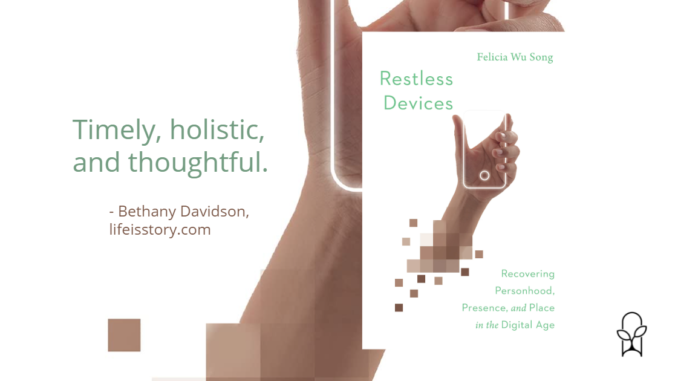
Published by IVP Academic on November 30, 2021
Genres: Academic, Non-Fiction
Buy on Amazon
Goodreads

We're being formed by our devices. Today's digital technologies are designed to captivate our attention and encroach on our boundaries, shaping how we relate to time and space, to ourselves and others, even to God. Our natural longing for relationship makes us vulnerable to the industrializing effects of social media. While we enjoy the benefits of digital tech, many of us feel troubled with its power and exhausted by its demands for permanent connectivity. Yet even as we grow disenchanted, attempting to resist the digital powers that be might seem like a losing battle. Sociologist Felicia Wu Song has spent years considering the personal and collective dynamics of living in digital ecosystems. In this book she combines psychological, neurological, and sociological insights with theological reflection to explore two major questions:
What kind of people are we becoming with personal technologies in hand? And who do we really want to be? Song unpacks the soft tyranny of the digital age, including the values embedded in our apps and the economic systems that drive our habits and their subtle yet pervasive effects. She then explores pathways of meaningful resistance that can be found in Christian tradition, especially counter-narratives about human worth, embodiment, relationality, and time. Considering digital practices through the lens of liturgy and formation, she offers practical experiments for individual and communal change. In our current digital ecologies, small behavioral shifts are not enough to give us freedom. We need a sober and motivating vision of our prospects to help us imagine what kind of life we hope to live--and how we can get there.
This is the best book I have read about technology, and I have read a vast number. I first became interested in social commentary about the digital world in 2013, alarmed by rapid changes in my peer group and wanting to better understand what was happening. Over the past decade, I have been intrigued to see how discourse surrounding technology has changed, especially as more people realize that technology is not neutral, and that responsibility does not solely lie with the user to use it correctly. As Felicia Wu Song explains near the beginning of this book, even though the alarmists in the 1990s were wrong in many of their assumptions, optimists about the Internet are having to face harsh realities about how much of our privacy, relationships, and emotional lives we have given up to technology companies that prioritize moneymaking over any sense of their users’ well-being.
Insightful and Holistic
Restless Devices: Recovering Personhood, Presence, and Place in the Digital Age summarizes relevant history, provides incisive social commentary into pressing issues, and provides ideas for how Christians can recover fuller lives through the resources inherent in their faith. This book is particularly powerful because Song is not arguing against or in favor of digital technology. This book is not a screed against Silicon Valley, and nor is it a defense of how we will all be fine as long as we take occasional media fasts. Instead, Song addresses the core questions that people need to ask themselves related to their use of technology. What is technology making them, and who do they want to be?
Restless Devices is very insightful and highly readable. Even though this is an academic book, Song communicates complex ideas clearly and well, also weaving in practical exercises to help readers reevaluate their relationship with technology and make gradual changes. Song writes about some of the reasons why it is so difficult for people to achieve lasting changes in their digital lives, but she provides positive, holistic ideas for how people can move forward.
The second half of the book focuses on how the Christian story and the spiritual resources within the Christian faith can help counterbalance the secular liturgies of our digital tools, and Song makes a strong argument for how recapturing a holistic Christian perspective can counteract struggles with fragmented attention, loneliness, community breakdown, and idolization of productivity. However, she also writes in a way that is welcoming and inviting for people of other faiths, and I would recommend this to anyone interested in the subject, regardless of their belief background.
Conclusion
This book is very timely and thoughtful. Because I have already read so much about technology and spiritual formation, not much in this book was new to me, but Restless Devices will now be my go-to recommendation, since it combines so much that I have read from multiple different sources. This is a wonderful resource for people who want to better understand and manage their digital lives, and I would highly recommend it to adults and to teenagers who are equipped for the book’s reading level. This would also be an excellent selection for a book club or church discipleship group, especially since working through this material in community can help people experience deeper perspective shifts and create lasting changes.



